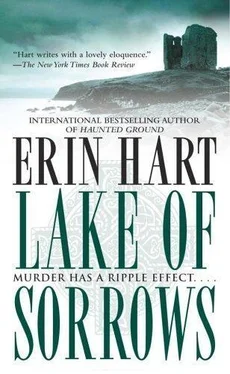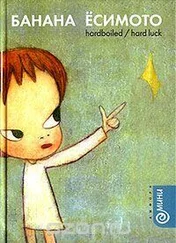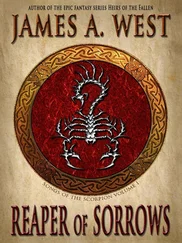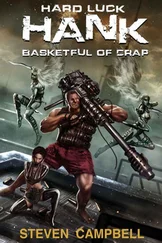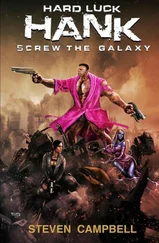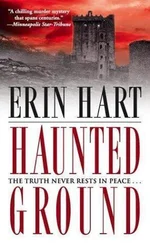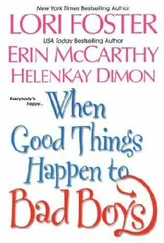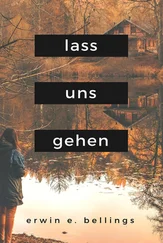“I know,” said Nora. “I’m sorry; there was nothing I could do.”
When help arrived, Nora heard voices as if through a fog. It wasn’t until the Guards lifted her away from Brona’s side to let the ambulance attendants take over that she felt her knees falter, and noticed the sharp bite of the wind. “Can someone get a blanket over here?” the Garda beside her shouted.
As they draped the blanket around her, she saw Cormac moving toward her through the blue-and-yellow crowd, his face haggard and drawn. His mouth dropped open at the sight of all the blood on her. “Not mine,” she said. “It’s not my blood.” She looked down at her hands and fell against him, suddenly so tired she could barely stand. She felt his chest contract as he let out a long, ragged sigh of relief and pulled her close. “Ah, Cormac, I never meant for any of this to happen.”
“Shhh. Be still now. Be still.” They stood in the middle of the dock as the Guards and emergency medical personnel moved in a constant mill around them, hurrying with stretchers, blankets, and rescue equipment.
“Don’t let go of me,” she whispered. “Please don’t let go.”
A few minutes later, the ambulance men took Brona away on a stretcher, but her face was uncovered. Detective Ward, following, stopped to speak to them. “She’s lost quite a lot of blood, but she’s alive,” he said. “I believe you saved her life, Dr. Gavin.”
Nora wanted to tell him that wasn’t the way it had happened at all—that it was Brona who had done the saving, who had nearly made the ultimate sacrifice to save her. She would tell him later. Ward turned to leave, and Nora caught his sleeve. “Wait—what was that explosion? Does anyone know? Charlie said the house was gone.”
“It was the Brazils’ house. Looks like a gas explosion. I don’t know any more, Dr. Gavin.”
“And what happened to Quill? He admitted killing Ursula and Rachel, and I saw him murder Dominic Brazil with my own eyes.”
“Yes, we know all that, Dr. Gavin. We know.”
“Then what happened to him? We were struggling, and he fell into the water. He didn’t get away?”
Ward’s eyes narrowed. “You really don’t know?” She shook her head. He put one arm around her shoulder and led her to the end of the dock. A hard breeze blew over the lake, raising a shiver on the water. “This lakeshore is treacherous, like quicksand. Struggling only makes it worse.”
In the marshy area below their feet, all that remained visible of Desmond Quill’s body was a pale hand sticking up out of the water. Gripped tightly in his fist was the bright gold collar, cast once more into its role as a votive offering, a dreadful sacrifice to appease the capricious gods.
Book Six
TO HEAL SORROW BY WEEPING
If it were possible to heal sorrow by weeping and to raise the dead with tears, gold were less prized than grief.
—Sophocles,
Scyrii . Frag. 510
Eleven days after Desmond Quill’s murderous spree had ended at Loughnabrone, the cottage at the Crosses was nearly restored to its former order. In the aftermath, Nora had focused on cleaning the house. It was something to do, something concrete. On hands and knees, scrubbing the wine stains from the floor and walls, she reflected that it might easily have been her blood spilled here. What had stopped Quill from slitting her throat—and why was she obsessed with the thought, unable to let it go? She knew enough about survivor guilt by now to recognize the signs, but that didn’t prevent her from seeing it again and again: Dominic Brazil’s inert body slumping sideways, the red flood creeping down Brona Scully’s chest, Quill’s dead hand grasping the bright gold collar.
Having something useful to do had helped to break up those visions over the past few days; they came less frequently now. And every minute she spent clearing away the damage down here was another minute she could avoid going upstairs and packing her suitcase, avoid thinking about how her time with Cormac was nearly at an end. The future loomed before her, unknown.
She considered the nameless, faceless creature her brother-in-law was supposed to be marrying in only four weeks’ time. It was easy to imagine the woman as reckless or desperate, perhaps not terribly bright. But Triona, beautiful and brilliant and usually very cautious, had fallen for him as well. Intelligence had little to do with it. Every relationship meant taking a chance, leaping headlong into the void, suspended by hope. And only some were lucky. She remembered the jumble of silk and the handcuffs from Owen Cadogan’s hidden stash, and the thin leather cord she’d seen around Ursula Downes’s throat. Maybe Ursula had been taking ever-greater chances, flirting with death, trusting that Owen Cadogan, or Desmond Quill, or whoever, for whatever reason, would loosen the cord in time to pull her back from the brink. For the first time Nora saw Ursula’s actions for what they had been, a cry for understanding and connection, born of a need as deep as that for food or water, or shelter, or warmth. Even Desmond Quill’s attraction to blood could be seen that way. A deep need for connection to something beyond themselves had been the very reason that ancient lake dwellers made sacrifices, sank weapons, gold—sometimes even fellow creatures—into dark and seemingly bottomless pools. Quill had been right about one thing, Nora thought; that we shouldn’t look back with contempt before taking a closer look at our own currently acceptable behavior.
She looked around at the books stacked back on the desk, the pictures repaired and rehung, the crockery—what was left of it—back on the sideboard shelves. She opened the box of new stoneware she’d found to replace the set Desmond Quill had smashed. Everything else that had been shattered in the past few days would be much harder to repair or put right, but this much was easy. Each piece was wrapped in crumpled tissue paper, cushioned against its fellows for transport. As she took out each new plate, unwrapped it and set it on the sideboard shelf, the same thoughts kept tumbling through her consciousness: Quill had known enough pertinent details about sacrificial victims found in bogs, and he had used that information to mislead the police into thinking that the recent murders might be some sort of ritual killings, stringing them together with Danny Brazil’s death. They had been rituals of a kind—Desmond Quill’s own blood homage to the talisman, the sacred object he sought.
Nora stood back to observe her work. The last plate was in place, and the dresser looked almost as it had before Quill had torn up the cottage looking for the drawing of the Loughnabrone collar. That was what they were calling it, now that it was safely in the hands of Niall Dawson and his fellow curators at the National Museum. The newspapers were calling it the find of the century, the television reporters breathlessly describing this spectacular new addition to the material heritage of Ireland. Once it had been examined, analyzed, and authenticated, it would no doubt go on display at the National Museum. She couldn’t help thinking of all the schoolchildren Quill had so scornfully envisioned, trooping past it, bored and jostling one another, oblivious to the collar’s ancient power and its recent bloody history.
It suddenly struck her that Quill had destroyed more than was necessary in searching for the drawing. He knew the drawing was in the book; all he’d had to do was find the book and take it. But he’d done much more: smashed all the crockery and the wine bottles, knocked over furniture; pulled random books out of the bookcases that lined the walls. This room was filled with evidence of a virulent anger and hatred, something she hadn’t witnessed in the admittedly brief time she’d spent with him. Contempt, yes, annoyance, condescension; but nothing like this. It was too late to find out what had triggered this fury. No one would ever know for certain.
Читать дальше
